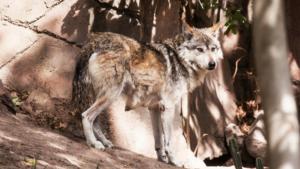
December 31, 2015
Online Messenger #325
Western Watersheds Project doesn’t bite its tongue on contentious issues. We are often the only voice in the media discussing directly the adverse impact of cows; our legal writing is potent and precise; our social media posts are uncompromising and insightful and sometimes just for fun. WWP is always on message that public lands livestock grazing is a threat to biodiversity, especially predators, an adverse impact on healthy ecosystems, and an economic scam that is perpetuated for the benefit of the very few.
Here are Ten Times that WWP spoke this truth in 2015 (in no particular order):
1. Straight talk about the intention of Wyoming’s Data Trespass Law: “The ag industry needed to come up with a solution to avoid any future listing of streams [as impaired] ever again. The intent is to eliminate the ability of citizens to collect the water quality data necessary to list streams ever again. It is a perfect way to get out from any accountability under the Clean Water Act.” – Jonathan Ratner, WWP’s Wyoming Director, in a story in High Country News. **also see bonus quote #11
2. Getting the facts straight about grazing and fire: “For a century and a half, livestock grazing has wreaked havoc on the sagebrush landscapes of the West, stripping away wildlife habitat, plant communities and beautiful scenery. More frequent and faster-burning fires move across the West, and we as federal taxpayers continue to subsidize the grazing of over 225 million acres of public land. The sage-steppe landscape goes up in smoke, we lose money, and the livestock industry gets a free ride. Something is wrong with this picture.” – Travis Bruner, WWP’s Executive Director, in an op-ed in the Magic Valley Times News.
3. On the logical disconnect of writing weaker Forest plans: “The former plans contained measures with specific, quantifiable objectives… and yet still fish habitat, riparian conditions, soil condition and watershed condition has declined. Obviously something needs to change, but is the cause of the decline that the former standards were too strong? … It is arbitrary and capricious to allege that improvement will occur without investigating the decline of these resources and making a connection to how the new, weakened standards will somehow improve them.” – Erik Ryberg, WWP attorney in comments on Prescott National Forest’s Draft Management Plan.
4. On the BLM’s willingness to cower in the face of rancher opposition to positive management changes: “Just two weeks after the new Greater Sage-grouse land use plans were released, the BLM once again shows us how little commitment they have to protecting important land and wildlife habitat when pressured by industry. What good are the new plans if the agencies cave in to every whim of the ranchers?” – Ken Cole, WWP’s Idaho Director, in a story on the Battle Mountain settlement controversy.
5. No holds barred about the deficiencies of the sage-grouse planning process: “There’s still time for the BLM to fix these failings before the final decisions are signed, but it might mean upsetting the livestock industry for the sake of true sage grouse conservation. For the BLM to do that really would be unprecedented.” – Greta Anderson, WWP’s Deputy Director, in an op-ed in the Reno Gazette Journal.
6. …. and the Bi-State sage grouse planning process: “WWP has long worked to conserve the Bi-State sage-grouse and was a co-petitioner on the original [ESA] listing petition. Unfortunately, the proposed management plan amendments are simply window-dressings that will not conserve these imperiled birds.” Dr. Mike Connor, WWP’s California Director in comments on California’s land use plans.
7. Pointing out the contradictions between right speech and right action: “BLM keeps saying that they are taking the conservation of sage-grouse seriously. If that were true, these decisions would have never been issued. To actually increase sheep impacts in important sage-grouse habitat is the exact opposite of what this species needs.” – Kristin Ruether, WWP’s Senior Attorney, in a press release about new litigation.
8. Pulling no punches about the senselessness of some range “improvements” on a national monument: “In essence, BLM’s proposal is to fence off 5,800 acres of priority sage-grouse habitat, plumb it with pipelines and troughs, and graze it heavily during sage-grouse breeding and nesting seasons… supposedly to improve its value as sage-grouse habitat.” Paul Ruprecht, WWP’s staff attorney, in a legal brief about allotments on Craters of the Moon.
9. Holding no fire on federal handouts to irresponsible livestock operators: “The proposal to spend nearly $200,000 of federal tax payer dollars for these projects to benefit livestock operators that clearly have an abysmal record of complying with any semblance of rangeland health guidelines in abhorrent. Surely there are much better uses for this money, including projects specifically designed to enhance wildlife habitat, rather than mitigate for extractive uses such as livestock grazing.” – Josh Osher, WWP’s Montana Director, in comments on a Forest Service project.
10. Calling out federal failures to maintain protection for two rare plants: “Studies have shown that grazing has removed every single plant in some of these populations. The American people have a right to expect government agencies to follow the best available science and their own rules to prevent extinction.” – Laura Welp, WWP’s Ecosystems Specialist, in an article in the Telluride News.
and bonus!
11. Comparing censorship in Wyoming to totalitarian regimes overseas:“This kind of law might seem less shocking in North Korea,” said Professor Justin Marceau with the Sturm College of Law at the University of Denver, who represents WWP in the case to overturn Wyoming’s data trespass law. (Thanks, Justin!)






